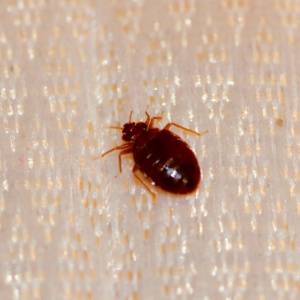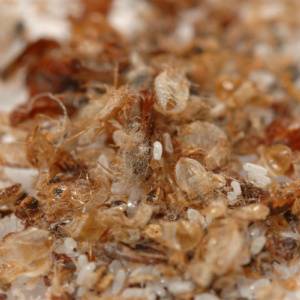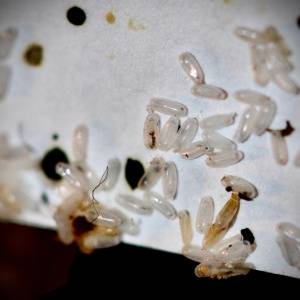Answers to Common Questions About Bed Bugs
Many homeowners have questions about bed bugs. Here's a collection of the bed bug FAQs we get most often.
Bed Bug FAQs #1:
How Do I Get Rid of Bed Bugs?
How Do You Kill Bed Bugs?
You can try retail bed bug sprays, but they are only a temporary solution. In many cases, the bugs have developed a resistance to certain insecticidal products.
This is why a multi-pronged approach known as Integrated Pest Management (IPM) is the most successful way to exterminate an infestation.
Some pesticides need time to work. As examples, commercial drying agents or growth regulators interrupt life cycles instead of killing on contact.
If you suspect you have bed bugs, you’ll want to call us for professional bed bug treatment right away.
Do Bed Bugs Die in the Washing Machine?
We recommend washing and drying your bedding after treating a bedbug infestation.
The water temperature needs be at least 120°F or higher to ensure that the bed bugs and their eggs are effectively killed in the washing machine.
And though a high-heat wash and a high-heat dry may kill most bed bugs, laundry day won't be enough to get rid of an infestation. Bugs may still live and breed in your mattress and upholstery.
Bed Bug FAQs #2:
Why Do Bed Bugs Come Back?
Can I Kill Bed Bugs Instantly?
Unfortunately, no. There are several reasons why an infestation can occur again after only one treatment.
- If the treatment consists of a spray or fogger, it must make contact with every bug. Those that are hiding during pesticide application will emerge and carry on. It only takes a handful to spawn a new swarm. A female can produce 1 to 7 eggs per day.
- Most pesticides will not kill eggs, so treatment must be repeated after the eggs have hatched.
- Many people assume they're only in the mattress, but they can be in the box springs, furniture, or even in other rooms of the house.
- If you have bed bugs, the homes of family members and friends may also become infested. If those homes don't get treated, bed bugs may return with you after a visit.



Bed Bug FAQs #3:
What Do Bed Bugs Look Like?
How Do I Identify Bed Bugs?
Knowing what to look for is important. Check for bed bugs with these signs of infestation:
- Live bugs
- Itchy red bumps (see what bed bug bites look like)
- Shed skins (exoskeletons)
- Dark, rust-colored stains (excrement)
- A sweet, musty odor
Can Bed Bugs Fly or Jump?
No, they're just very fast crawlers!
What Do Bed Bugs Eat?
You! They feed on you, sorry! Bed bugs sustain on the blood of humans. They only come out at night and are attracted to your body heat and the C02 you exhale.
They, and this is gross, probe the skin with their mouthparts to find an area where the blood will flow quickly into their bodies as they feed for up to 10 minutes!
Bed Bug FAQs #4:
Where Do Bed Bugs Come From?
Where Could I Get Bed Bugs and Bring them Home?
You can pick up bed bugs anywhere people congregate to sit or sleep.
Bed bugs are infamous uninvited hitch-hikers that bum a ride home with you on items like your purse, suitcase, used mattress or furniture.
A bed bug population can double every 16 days, so an infestation does not take long to occur from just one female invader.
Check our quick guide to help identify and prevent bringing bed bugs home with you when traveling or out in your community.
Where are Bed Bugs in my Community?
Bed bugs are found in nearly every region of the globe.
According to the National Pest Management Association, hotels and nursing homes top the list of locations that most frequently experience infestations.
Other common hot spots include schools, daycares, college dorms, office buildings, hospitals, movie theaters, and public transportation.
And, of course, bed bugs are found in homes and apartments.
Can Bed Bugs Live in a Car?
If you inadvertently load an infested piece of luggage, a backpack, clothing or furniture into your car, some of the little bloodsuckers might remain in your vehicle.
Once in your car, they can live a long time without food (blood). Nymphs (juveniles) can live without food for several months, while mature bed bugs can survive for up to a year.
However, they cannot tolerate temperatures lower than 46 degrees Fahrenheit or higher than 113. That means, if you live in a colder climate, they would not survive the winter.
Likewise, if you live in a warmer climate, summer heat in your car would likely kill them. Cars kept in climate-controlled garages would be most at risk for a long-term infestation.
Inspect your car for physical signs of infestation, just as you would a hotel room or your home. Be sure to check the car seat seams and stitching, console, ceiling panel, and the glove box
A mild infestation may be successfully treated by cleaning out your car, vacuuming it, and steam cleaning. For a severe infestation, consult with your Croach® pest control technician.
Bed Bug FAQs #5:
Are Bed Bugs Dangerous?
How Bad are Bed Bugs?
Bed bug bites aren't dangerous in the sense of a venomous black widow spider bite or a mosquito bite that transmits a disease.
They are mostly a disgusting nuisance.
However, if you are allergic, bed bug bites can be life-threatening due to the possibility of suffering from anaphylactic shock. Some people encounter secondary infections from excessive scratching.
Another consequence is that the bites can disturb your sleep. The negative effects of a sleep disturbance can cascade into every area of your life, causing anxiety, depression, and other mental health issues.
These adverse reactions are serious enough for bed bugs to be considered public health pests.
Your Local Croach® Bed Bug Exterminator
Our technicians are skilled and experienced in bed bug extermination. And we offer a free inspection.
However, please understand that it will require more than one treatment, and you'll need to follow the instructions of your technician between visits.
Croach® Bed Bug Treatment Service Area
Seattle, WA (with branch offices in Mukilteo, Sumner, Kirkland, Tacoma, and Mount Vernon. Tri-Cities, WA (located out of Kennewick). Portland, OR (with a shop in Beaverton). Spokane, WA (headquartered in Post Falls, ID). Kooskia and Lewiston, ID. Boise, ID. Denver, CO with offices in Aurora and Frederick.
Salt Lake City, UT (operating out of Sandy). Columbia, SC and Greenville, SC.

